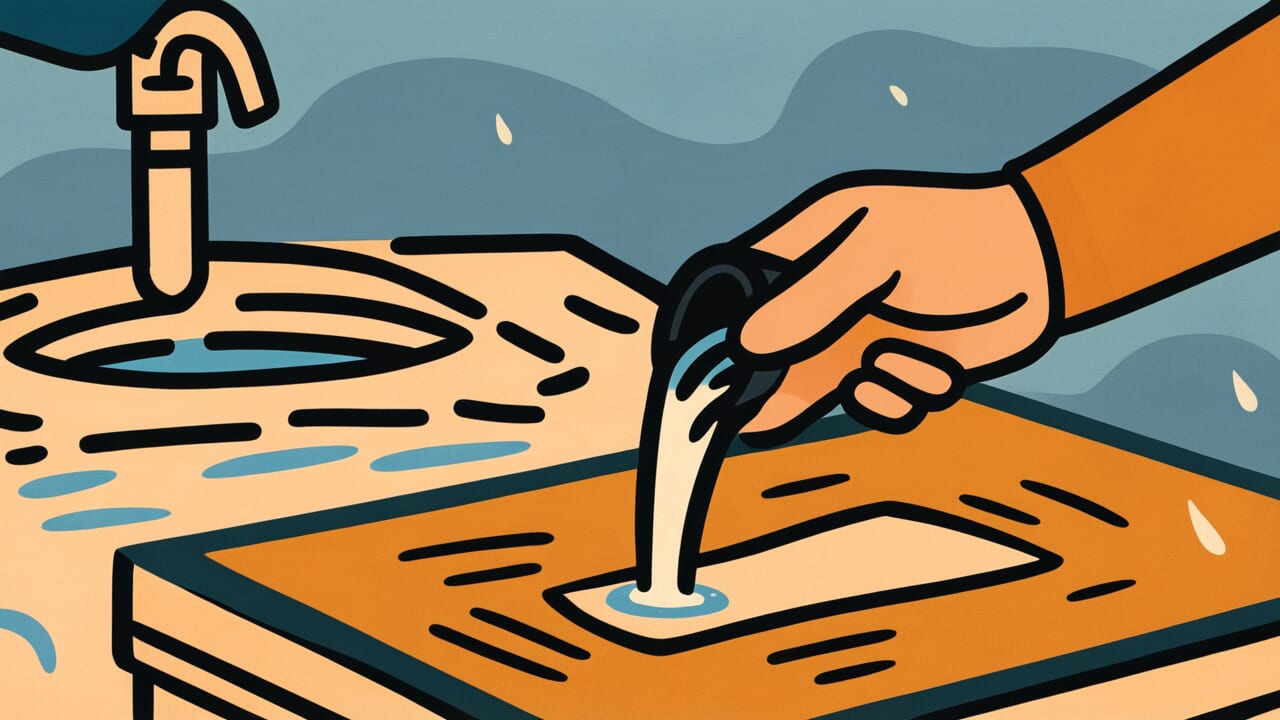How to Read “Like pouring water on oiled paper”
aburagami ni mizu wo sosogu yō
Meaning of “Like pouring water on oiled paper”
“Like pouring water on oiled paper” means completely rejecting what others say, just as oiled paper repels water.
This proverb describes a situation where advice or suggestions don’t reach someone’s heart. The words slide off like water rolling down the surface of oiled paper.
No matter how valuable the opinion or advice might be, it doesn’t sink into the person’s mind at all. It just traces the surface and flows away.
People use this expression when criticizing someone who refuses to listen no matter how many times you try to persuade them. It also expresses the frustration of feeling like your words aren’t getting through.
Even today, this phrase is used to point out stubborn attitudes or unwillingness to accept others’ opinions. Its meaning hasn’t changed over time.
Origin and Etymology
No clear written records explain the origin of this proverb. However, we can make interesting observations from the words themselves.
Oiled paper is Japanese paper soaked with oil to make it waterproof. During the Edo period, people widely used it for umbrellas, raincoats, and packaging materials.
Paper containing oil repels water beautifully. No matter how much water you pour on it, the water just slides off the surface. It never soaks into the paper.
This physical phenomenon likely became a metaphor for human psychology. Just as water doesn’t soak into oiled paper, other people’s words don’t enter a closed heart.
People probably connected this everyday observation with human behavior.
For people in the Edo period, oiled paper was a familiar everyday item. On rainy days, everyone with an umbrella watched raindrops roll down the oiled paper surface.
This visually clear phenomenon was perfect for expressing stubborn refusal to accept others’ opinions.
The proverb compares words to water and an unwilling heart to oiled paper. It shows the delicate observation skills characteristic of Japanese people.
Interesting Facts
After the Meiji period, oiled paper gradually fell out of use as Western paper became popular. However, it’s still made today as a traditional craft item.
Traditional products like Japanese umbrellas and lanterns sometimes still use oiled paper.
The waterproof quality of oiled paper comes from coating Japanese paper with plant oil many times. The oil fills the gaps between paper fibers and physically blocks water from entering.
This technique didn’t originate in Japan. It came from China. But Japan developed it uniquely, creating thinner and stronger oiled paper.
Usage Examples
- No matter what I say to him, it’s like pouring water on oiled paper. He refuses to listen at all.
- Even when I explain it’s for his health, it’s like pouring water on oiled paper. My father continues to overeat and overdrink.
Universal Wisdom
“Like pouring water on oiled paper” expresses a fundamental difficulty in human communication. No matter how sincerely you speak, your words won’t reach someone whose heart is closed.
Our ancestors understood this simple yet serious truth.
Why do people reject others’ words? It might be to protect their pride, maintain their beliefs, or from fear of change.
Humans have an instinctive defense mechanism. We don’t want our thoughts and way of life denied.
Others’ advice sometimes means admitting our own judgment was wrong. This brings great psychological pain.
This proverb has been passed down through generations because this gap between people is a timeless universal challenge. No matter how much science advances or society changes, opening someone’s heart remains difficult.
At the same time, this proverb questions the speaker too. Is it really only the listener’s fault when they won’t listen?
Might there be problems with how you communicate or your relationship? This proverb quietly teaches us about the complexity of human relationships and the difficulty of mutual understanding.
When AI Hears This
When you pour water on oiled paper, the water droplets don’t soak in. They roll off like living creatures.
Behind this phenomenon lies molecular-level “incompatibility.”
Water molecules are electrically uneven. They have positive and negative parts. So water molecules strongly attract each other.
Oil molecules, however, are electrically balanced. They don’t attract water at all.
When you place water on oiled paper, the water molecules decide: “Rather than holding hands with oil, let’s stick together with our own kind.”
As a result, water tries to minimize its surface area and becomes spherical.
The contact angle at this moment can exceed 120 degrees. In other words, the water droplet barely touches the paper. It contacts at just a point.
It’s like when you high-five someone you dislike. You use just your fingertips, not your whole palm.
What’s interesting is that this “perfect separation” has become the foundation of modern technology. Umbrella water repellent coatings, smartphone waterproofing, and even surgical sutures all apply this molecular behavior at interfaces.
Oiled paper and water protect their own properties by not mixing. This isn’t “waste.” It’s nature’s wisdom of respecting boundaries.
Lessons for Today
This proverb teaches us two important things.
First, when you want to communicate something to others, understanding their state of mind matters as much as your words’ content.
No matter how correct your words are, they won’t reach someone who isn’t ready to receive them.
By adjusting timing, relationships, and delivery methods, the same content can be received very differently. Sometimes you need patience to wait for someone’s heart to open.
Second, it’s important to reflect on whether you yourself have become like oiled paper. We all unconsciously block out opinions we don’t want to hear.
Especially when we believe we’re right, we find it harder to accept different perspectives.
Sometimes we need the courage to stop and check whether our own hearts are truly open.
Personal growth begins with accepting new ideas. Maintaining a flexible heart is the first step toward a richer life.



Comments